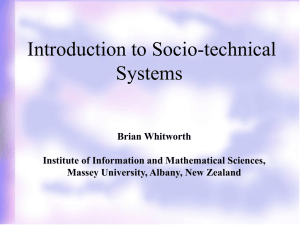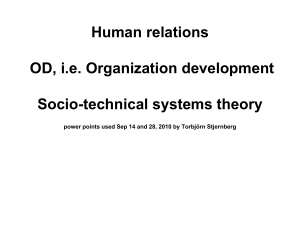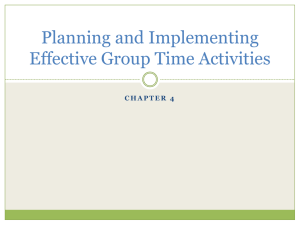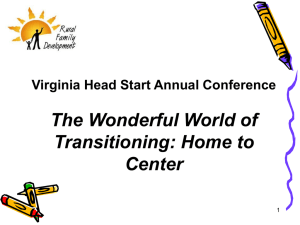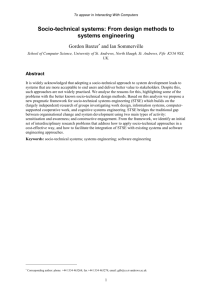Urban Studies Volume 51, Issue 7, May 2014 1. Title: Urban Energy
advertisement
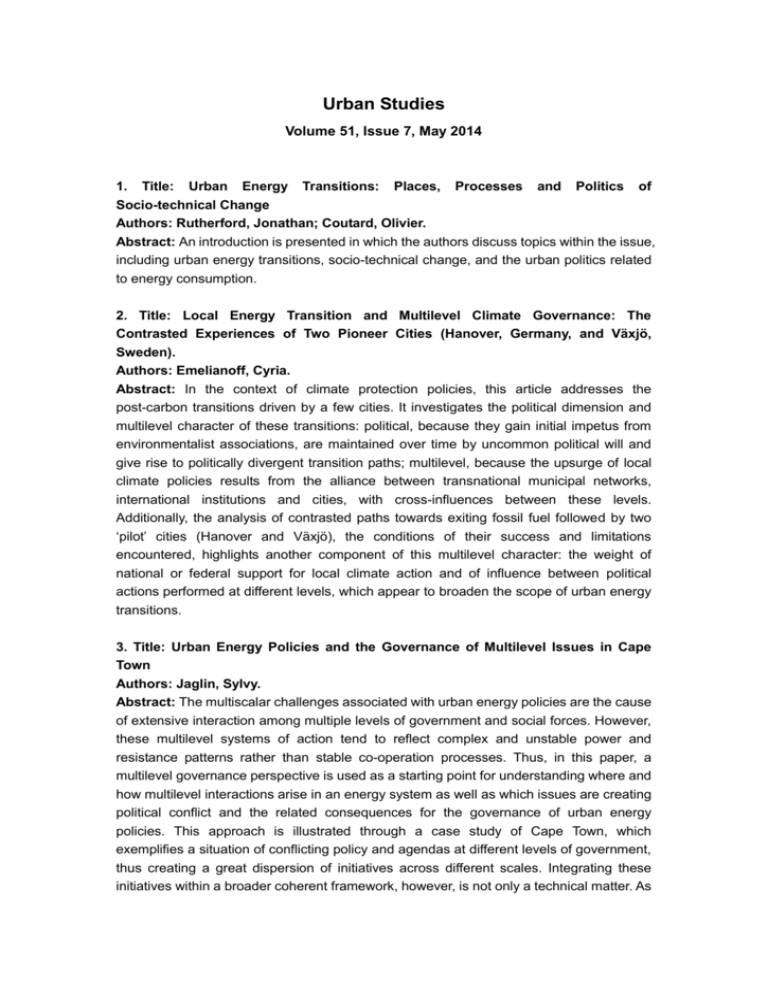
Urban Studies Volume 51, Issue 7, May 2014 1. Title: Urban Energy Transitions: Places, Processes and Politics of Socio-technical Change Authors: Rutherford, Jonathan; Coutard, Olivier. Abstract: An introduction is presented in which the authors discuss topics within the issue, including urban energy transitions, socio-technical change, and the urban politics related to energy consumption. 2. Title: Local Energy Transition and Multilevel Climate Governance: The Contrasted Experiences of Two Pioneer Cities (Hanover, Germany, and Växjö, Sweden). Authors: Emelianoff, Cyria. Abstract: In the context of climate protection policies, this article addresses the post-carbon transitions driven by a few cities. It investigates the political dimension and multilevel character of these transitions: political, because they gain initial impetus from environmentalist associations, are maintained over time by uncommon political will and give rise to politically divergent transition paths; multilevel, because the upsurge of local climate policies results from the alliance between transnational municipal networks, international institutions and cities, with cross-influences between these levels. Additionally, the analysis of contrasted paths towards exiting fossil fuel followed by two ‘pilot’ cities (Hanover and Växjö), the conditions of their success and limitations encountered, highlights another component of this multilevel character: the weight of national or federal support for local climate action and of influence between political actions performed at different levels, which appear to broaden the scope of urban energy transitions. 3. Title: Urban Energy Policies and the Governance of Multilevel Issues in Cape Town Authors: Jaglin, Sylvy. Abstract: The multiscalar challenges associated with urban energy policies are the cause of extensive interaction among multiple levels of government and social forces. However, these multilevel systems of action tend to reflect complex and unstable power and resistance patterns rather than stable co-operation processes. Thus, in this paper, a multilevel governance perspective is used as a starting point for understanding where and how multilevel interactions arise in an energy system as well as which issues are creating political conflict and the related consequences for the governance of urban energy policies. This approach is illustrated through a case study of Cape Town, which exemplifies a situation of conflicting policy and agendas at different levels of government, thus creating a great dispersion of initiatives across different scales. Integrating these initiatives within a broader coherent framework, however, is not only a technical matter. As urban energy policies deal with multilevel issues, they imply negotiating dynamic and complex compromises between different types of organisations and authorities while shaping their governance is also a matter of politics. 4. Title: The Interplay of Urban Energy Policy and Socio-technical Transitions: The Eco-cities of Graz and Freiburg in Retrospect Authors: Rohracher, Harald; Späth, Philipp. Abstract: The cities of Graz in Austria and Freiburg in Germany have been perceived as ecological model cities since the late 1980s.This is shown by various international awards, press coverage and many visitors from other municipal administrations. Both cities have been well known for their attempts to bring about transitions towards more sustainable and low-carbon energy systems. The comparison of Graz and Freiburg over a period of two decades enables us to study how differing contexts, actor constellations and historic developments shape the transformation of energy systems towards greater sustainability. It is argued that understanding the role of cities for energy transitions requires a detailed examination of the coupled dynamics of socio-technical interactions across the levels of niches, regimes and landscapes on the one hand, and multilevel systems of governance on the other. At these intersections new, although spatially confined, socio-technical constellations of sustainable energy provision may emerge and be stabilised. Nevertheless, empirical evidence shows that it is misleading to conclude that true socio-technical transitions are taking place in these cities, even though a number of foundations for long-term change processes have been laid. 5. Title: Socio-technical Change and the Politics of Urban Infrastructure: Managing Energy in Berlin between Dictatorship and Democracy Authors: Moss, Timothy. Abstract: This paper reconstructs the trajectory of energy efficiency policies in Berlin from the 1920s to today in order to illustrate how the shifting political and socioeconomic conditions of a city can shape urban energy provision and consumption. Taking a long-term perspective on the relationship between urban transitions and energy policy, it investigates how the geo-political turbulence, regime diversity and socioeconomic volatility experienced by 20th-century Berlin influenced strategies of electricity generation and use in the city. Drawing on different ways of conceptualising change to socio-technical systems in the literature, the paper’s findings present a more differentiated picture of urban energy transitions than notions of path dependency and transition pathways imply, highlighting the importance of non-linear trends, political contestation and crisis discourses in and beyond the city and their relevance for reconfiguring urban energy systems today. 6. Title: The Vicissitudes of Energy and Climate Policy in Stockholm: Politics, Materiality and Transition Authors: Rutherford, Jonathan. Abstract: Through analysis of the orientations, conflicts and challenges of recent energy–climate policy in Stockholm, this paper interrogates how energy and climate become (translated as) a set of issues which come to matter in the local urban arena for different social and political interests. Drawing in particular on recent theoretical work on urban materiality, it is argued that ongoing, ‘everyday’ local struggles over the processes and practices of transformation of the urban fabric constitute repoliticised settings through and in which the orientations of urban energy transition are materially understood, experienced and performed in diverging ways. In ‘mapping’ the undulating politics of energy–climate matters, the paper outlines an alternative way of following and/or measuring energy and carbon flows through the urban environment. 7. Title: Low-carbon Transitions and the Reconfiguration of Urban Infrastructure Authors: Bulkeley, Harriet; Castán Broto, Vanesa; Maassen, Anne. Abstract: Over the past decade, a growing body of research has examined the role of cities in addressing climate change and the institutional and political challenges which they encounter. For the most part, in these accounts, the infrastructure networks, their material fabric, everyday practices and political economies, have remained unexamined. In this paper, it is argued that this is a critical omission and an approach is developed for understanding how urban responses to climate change both configure and are configured by infrastructure networks. Central to any such analysis is the conception of how and why (urban) infrastructure networks undergo change. Focusing on urban energy networks and on the case of London, the paper argues for an analysis of the ‘urban infrastructure regimes’ and ‘experiments’ through which climate change is governed. It is found that climate change experiments serve as a means through which dominant actors articulate and test new ‘low-carbon’ logics for urban infrastructure development. It is argued that experiments work by establishing new circuits, configuring actors in new sets of relations and through these means realising the potential for addressing climate change in the city. At the same time, experiments become sites of conflict, a means through which new forms of urban circulation can be confined and marginalised, leaving dominant energy regimes (relatively) intact. 8. Title: Suburbia under an Energy Transition: A Socio-technical Perspective Authors: Dodson, Jago. Abstract: This paper assesses the effects on suburbia of an energy transition to less carbon- or petroleum-intensive energy urban forms using a socio-technical theoretical perspective. The paper argues that while suburbia is the predominant form of urbanisation in advanced nations, especially North America and Australia, its socio-technical composition is insufficiently understood by urban scholars. Using a socio-technical theoretical perspective, the paper argues that suburbia should be seen a complex ‘assemblage’ that is configured through socio-material relations of land use, transport technology, energy and money credit. This system is also differentiated by social status and infrastructure access deficits. The paper argues that suburbia faces a number of socio-technical challenges from an energy transition principally due to heavy mobility reliance on motor vehicles. The paper sets out some potential trajectories of transformation for suburbia under an energy transition. 9. Title: Transnational Transitions: The Diffusion and Integration of Mechanical Cooling Authors: Shove, Elizabeth; Walker, Gordon; Brown, Sam. Abstract: In less than a generation, air conditioning has spread around the world, increasing energy consumption and producing demand where none existed before. How has this come about? This article asks whether transition theories (and the multilevel perspective as an exemplar) are of value in addressing this question and what other approaches might be developed. It is concluded that what seems to be the transnational diffusion of mechanical cooling is best understood as an outcome of multisited processes in which air conditioning is integrated into practices like those of office work, nursing, taking a luxury break or simply living at home. Rather than mapping diffusion across a stable terrain, this perspective argues for a more sophisticated interpretation of how mechanical cooling remakes practices and the places in which they are reproduced. This conclusion has implications for efforts to stem air conditioning and the energy demand associated with it. 10. Title: The Contested Energy Future of Amman, Jordan: Between Promises of Alternative Energies and a Nuclear Venture Authors: Verdeil, Éric. Abstract: Metropolitan authorities and local business elites are often seen as major players in the energy transition in the city. Such energy transitions are mostly conceived of as low carbon technologies, which permit the retrofitting of urban infrastructure and the rebundling of metabolic circuits. This article contests these views by highlighting the major role of non-urban energy sector institutions and actors. By examining the connections between technology, space and energy politics, and by using a relational understanding of the urban, this article explores the case of Amman’s energy transition. The growth of consumption coupled with new energy practices face a problematic supply because of shifts in regional geopolitics. This situation has prompted energy transition policies, among which are a green growth programme and the building of a nuclear power plant at the edge of the city. The article analyses the socio-political assemblages that shape those policies and unravels the competing interests at stake. It demonstrates the political and highly unruly nature of energy transitions.

![Understanding barriers to transition in the MLP [PPT 1.19MB]](http://s2.studylib.net/store/data/005544558_1-6334f4f216c9ca191524b6f6ed43b6e2-300x300.png)
